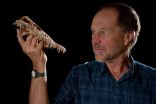(Press-News.org) WASHINGTON (Sept. 22, 2014) — Following a healthy lifestyle, including maintaining a healthy weight and diet, exercise, not smoking and moderating alcohol intake, could prevent four out of five coronary events in men, according to a new study publishing today in the Journal of the American College of Cardiology.
While mortality from heart disease has declined in recent decades, with much of the reduction attributed to medical therapies, the authors said prevention through a healthy lifestyle avoids potential side effects of medication and is more cost effective for population-wide reductions in coronary heart disease.
For the study, researchers examined a population of 20,721 healthy Swedish men aged 45-79 years of age and followed them for 11 years. Lifestyle choices were assessed through a questionnaire exploring diet, alcohol consumption, smoking status, level of physical activity and abdominal adiposity (belly fat). Men in the study with the lowest risk were non-smokers, walked or cycled for at least 40 minutes per day, exercised at least one hour per week, had a waist circumference below 95 centimeters, consumed moderate amounts of alcohol, and followed a healthy diet with a regular consumption of fruits, vegetables, legumes, nuts, reduced-fat dairy products, whole grains and fish.
The researchers found a clear reduction in risk for heart attack for each individual lifestyle factor the participants practiced. For instance having a low-risk diet together with a moderate alcohol consumption led to an estimated 35 percent lower risk of heart attack compared to the high-risk group, those who practice none of the low-risk factors.
Men who combined the low-risk diet and moderate alcohol consumption with not smoking, being physically active and having a low amount of abdominal fat, had 86 percent lower risk. Researchers found similar results in men with hypertension and high cholesterol levels.
"It is not surprising that healthy lifestyle choices would lead to a reduction in heart attacks," said Agneta Akesson, Ph.D., Associate Professor at the Institute of Environmental Medicine, Karolinska Institutet, Stockholm, and lead author of the study. "What is surprising is how drastically the risk dropped due to these factors."
According to the authors, less than 2 percent of the American population conforms to what is defined as ideal cardiovascular health. The burden of cardiovascular disease could be significantly reduced through programs targeted to men and promoting low-risk lifestyle choices. Even in those who take medication, an additional reduction in risk for chronic heart disease has been observed in those with a healthy lifestyle.
"It is important to note that these lifestyle behaviors are modifiable, and changing from high-risk to low-risk behaviors can have great impact on cardiovascular health," Akesson said. "However, the best thing one can do is to adopt healthy lifestyle choices early in life."
INFORMATION:
The American College of Cardiology is a 47,000-member medical society that is the professional home for the entire cardiovascular care team. The mission of the College is to transform cardiovascular care and to improve heart health. The ACC leads in the formation of health policy, standards and guidelines. The College operates national registries to measure and improve care, provides professional medical education, disseminates cardiovascular research and bestows credentials upon cardiovascular specialists who meet stringent qualifications. For more information, visit cardiosource.org/ACC.
The Journal of the American College of Cardiology, which publishes peer-reviewed research on all aspects of cardiovascular disease, is the most widely read cardiovascular journal worldwide. JACC is ranked No. 1 among cardiovascular journals worldwide for its scientific impact.
Healthy lifestyle choices may dramatically reduce risk of heart attack in men
Four out of 5 heart attacks may be prevented with healthy behaviors
2014-09-22
ELSE PRESS RELEASES FROM THIS DATE:
Immune response turned up, not down, by flu during pregnancy, Stanford/Packard study finds
2014-09-22
Pregnant women have an unusually strong immune response to influenza, an unexpected finding that may explain why they get sicker from the flu than other healthy adults, new research from the Stanford University School of Medicine and Lucile Packard Children's Hospital Stanford has found.
The results were surprising because immune responses are thought to be weakened by pregnancy to prevent the woman's body from rejecting her fetus.
The study, which will be published online Sept. 22 in the Proceedings of the National Academy of Sciences, is the first to examine the ...
Firelight talk of the Kalahari Bushmen
2014-09-22
SALT LAKE CITY, Sept. 22, 2014 – After human ancestors controlled fire 400,000 to 1 million years ago, flames not only let them cook food and fend off predators, but also extended their day.
A University of Utah study of Africa's Kalahari Bushmen suggests that stories told over firelight helped human culture and thought evolve by reinforcing social traditions, promoting harmony and equality, and sparking the imagination to envision a broad sense of community, both with distant people and the spirit world.
Researchers previously studied how cooking affected diets and ...
University of Utah engineers unlock potential for faster computing
2014-09-22
SALT LAKE CITY, Sept. 22, 2014 – University of Utah engineers discovered a way to create a special material – a metal layer on top of a silicon semiconductor – that could lead to cost-effective, superfast computers that perform lightning-fast calculations but don't overheat.
This new "topological insulator" behaves like an insulator on the inside but conducts electricity on the outside and may pave the way for quantum computers and fast spintronic devices.
The research, led by University of Utah materials science and engineering professor Feng Liu, was published today ...
Lego-like modular components make building 3-D 'labs-on-a-chip' a snap
2014-09-22
Thanks to new LEGO®-like components developed by researchers at the USC Viterbi School of Engineering, it is now possible to build a 3-D microfluidic system quickly and cheaply by simply snapping together small modules by hand.
Microfluidic systems are used in many fields including engineering, chemistry and biotechnology to precisely manipulate small volumes of fluids for use in applications such as enzymatic or DNA analysis, pathogen detection, clinical diagnostic testing, and synthetic chemistry. Traditionally, microfluidic devices are built in a cleanroom on a two-dimensional ...
Platelets modulate clotting behavior by 'feeling' their surroundings
2014-09-22
Platelets, the tiny cell fragments whose job it is to stop bleeding, are very simple. They don't have a cell nucleus. But they can "feel" the physical environment around them, researchers at Emory and Georgia Tech have discovered.
Platelets respond to surfaces with greater stiffness by increasing their stickiness, the degree to which they "turn on" other platelets and other components of the clotting system, the researchers found.
"Platelets are smarter than we give them credit for, in that they are able to sense the physical characteristics of their environment and ...
Genetic switch regulates a plant's internal clock based on temperature
2014-09-22
Scientists have discovered a key molecular cog in a plant's biological clock – one that modulates the speed of circadian (daily) rhythms based on temperature.
Transcription factors, or genetic switches, drive gene expression in plants based on external stresses – such as light, rain, soil quality, or even animals grazing on them. A team of researchers at USC has isolated one, called FBH1, that reacts to temperature – tweaking the rhythm here and there as needed while in keeping it on a consistent track.
"Temperature helps keep the hands of the biological clock in the ...
Massachusetts General study reveals gene expression patterns in pancreatic CTCs
2014-09-22
Analysis of circulating tumor cells (CTCs) in a mouse model of pancreatic cancer identified distinct patterns of gene expression in several groups of CTCs, including significant differences from the primary tumor that may contribute to the ability to generate metastases. In their study reported in the Sept. 25 issue of Cell Reports, investigators from the Massachusetts General Hospital (MGH) Cancer Center identified several different classes of pancreatic CTCs and found unexpected factors that may prove to be targets for improved treatment of the deadly tumor.
"Our ...
Infant solar system shows signs of windy weather
2014-09-22
Astronomers using the Atacama Large Millimeter/submillimeter Array (ALMA) have observed what may be the first-ever signs of windy weather around a T Tauri star, an infant analog of our own Sun. This may help explain why some T Tauri stars have disks that glow weirdly in infrared light while others shine in a more expected fashion.
T Tauri stars are the infant versions of stars like our Sun. They are relatively normal, medium-size stars that are surrounded by the raw materials to build both rocky and gaseous planets. Though nearly invisible in optical light, these disks ...
Old drug may be key to new antibiotics
2014-09-22
Hamilton, ON (September 22, 2014) – McMaster scientists have found that an anticonvulsant drug may help in developing a new class of antibiotics.
Although dozens of antibiotics target what bacteria do, their study has looked at how a certain part of bacteria are created, and they found there is a way of stopping it.
The discovery is important as there is growing concern worldwide about how antibiotic resistance is making the cures for infections ineffective. The World Health Organization has declared that antibiotic resistance is a major threat to global health security. ...
Answer to restoring lost island biodiversity found in fossils
2014-09-22
GAINESVILLE, Fla. --- Many native species have vanished from tropical islands because of human impact, but University of Florida scientists have discovered how fossils can be used to restore lost biodiversity.
The key lies in organic materials found in fossil bones, which contain evidence for how ancient ecosystems functioned, according to a new study available online and in the September issue of the Journal of Herpetology. Pre-human island ecosystems provide vital clues for saving endangered island species and re-establishing native species, said lead author Alex Hastings, ...
LAST 30 PRESS RELEASES:
Local water supply crucial to success of hydrogen initiative in Europe
New blood test score detects hidden alcohol-related liver disease
High risk of readmission and death among heart failure patients
Code for Earth launches 2026 climate and weather data challenges
Three women named Britain’s Brightest Young Scientists, each winning ‘unrestricted’ £100,000 Blavatnik Awards prize
Have abortion-related laws affected broader access to maternal health care?
Do muscles remember being weak?
Do certain circulating small non-coding RNAs affect longevity?
How well are international guidelines followed for certain medications for high-risk pregnancies?
New blood test signals who is most likely to live longer, study finds
Global gaps in use of two life-saving antenatal treatments for premature babies, reveals worldwide analysis
Bug beats: caterpillars use complex rhythms to communicate with ants
High-risk patients account for 80% of post-surgery deaths
Celebrity dolphin of Venice doesn’t need special protection – except from humans
Tulane study reveals key differences in long-term brain effects of COVID-19 and flu
The long standing commercialization challenge of lithium batteries, often called the dream battery, has been solved.
New method to remove toxic PFAS chemicals from water
The nanozymes hypothesis of the origin of life (on Earth) proposed
Microalgae-derived biochar enables fast, low-cost detection of hydrogen peroxide
Researchers highlight promise of biochar composites for sustainable 3D printing
Machine learning helps design low-cost biochar to fight phosphorus pollution in lakes
Urine tests confirm alcohol consumption in wild African chimpanzees
Barshop Institute to receive up to $38 million from ARPA-H, anchoring UT San Antonio as a national leader in aging and healthy longevity science
Anion-cation synergistic additives solve the "performance triangle" problem in zinc-iodine batteries
Ancient diets reveal surprising survival strategies in prehistoric Poland
Pre-pregnancy parental overweight/obesity linked to next generation’s heightened fatty liver disease risk
Obstructive sleep apnoea may cost UK + US economies billions in lost productivity
Guidelines set new playbook for pediatric clinical trial reporting
Adolescent cannabis use may follow the same pattern as alcohol use
Lifespan-extending treatments increase variation in age at time of death
[Press-News.org] Healthy lifestyle choices may dramatically reduce risk of heart attack in menFour out of 5 heart attacks may be prevented with healthy behaviors






